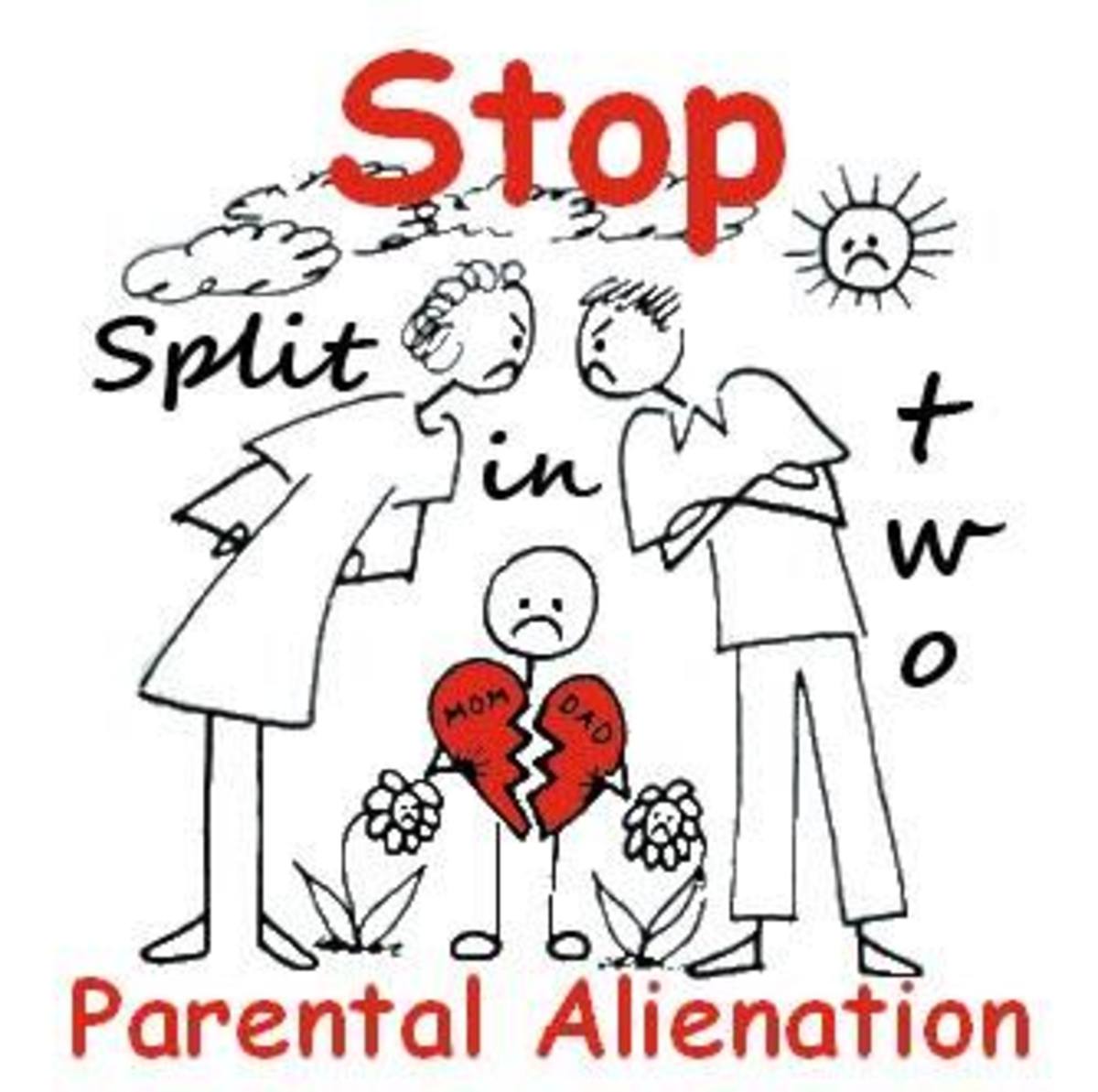* Coparenting after Divorce

Love your children...
When we got married, we certainly didn't plan on getting divorced, but sadly divorce can happen to the best of us. Sometimes two people just can't get along no matter how hard they try.
40% - 50% of all first marriages end in divorce.
If they were under the age of 25 when they married, their likelihood of divorce increases to 50% - 64%.
So there must be something to the "We were too young" theory many people walk away with.
Divorce isn't the easiest thing to go through, even in the best of circumstances. Our hopes and dreams have been shattered, our plans for the future are gone, and love often gives way to hate. It is so easy to allow anger to build into bitterness, but bitterness doesn't serve anyone, especially innocent bystanders.
As soon as you get divorced, your former spouse's responsibilities towards you might end, but if there are children involved you will always have to have some sort of relationship.
So many hurt feelings and unresolved issues lie just below the surface, and children are often caught in the crossfire, even by the most well-meaning parents.
However, there is no rule stating that people who are divorced can't try to get along, even when they disagree on certain issues, IF all parties are willing to work towards the same goal:
Raising healthy kids!
What is coparenting?
Coparenting stems from the idea that a child deserves to be raised by both parents, even in the case of a divorce. Mothers and fathers both have things to teach a child, and a child deserves the security of knowing that they are loved by both parents, and free to love both parents equally without choosing sides.
Children coping with a divorce are prone to fear of abandonment, sleep disturbances, intense anger, and depression. Psychosomatic illness may also become a problem. Older children may begin to seek a way to replace the security they lost when their parents divorced through the use of drugs, alcohol, and promiscuity.
The nastier the divorce is, the more likely this becomes. Children need the security of having both the mother and the father as an active part of their lives. Coparenting functions as an attempt to disrupt the child's life as little as possible.
Recently, more and more courts are leaning towards shared custody for that reason. Barring the presence of physical, sexual, or emotional abuse, courts understand the importance of a healthy relationship with both parents.
After a divorce, one of the most important things you can decide to do for your children is to love them more than you hate one another. When both parties commit to working together to focus on what is best for the child, that child has a much better chance of growing into a healthy adult, which should be every parent's goal in the first place.

Setting the ground rules
When my first marriage came to an end, there was quite a bit of bitterness on both parts. I blamed him, he blamed me, and neither of us really wanted to take responsibility for the problems in our relationship.
In the years since, I have come to accept that I wasn't a very good wife to him, and he knows he wasn't a good husband to me. It took a long time to accept that this did not mean either of us were bad people.
He's a great guy and I'm a nice girl, we just weren't good people together. We have both since gone on to develop healthy relationships with new spouses, and a solid friendship among the four of us.
Our journey into coparenting began with a simple request, that we love the children more than we hated each other. As the new spouses joined the family, they too agreed that we needed to do what was best for the kids, and seven years later we function more as old friends than ex-spouses.
As a result, our children are fairly well-adjusted. They know that they are free to love all of us equally, and that we all love them. Children who know they are loved at home fare better in the outside world, they do not have as many discipline problems, and do far better academically.
I realize that peaceful coparenting is not possible in every divorce situation. You may be the only party willing to work on it, but that's okay. If even one of you tries to do what is best for the kids, it is a huge step and eventually the other partner might see the changes in you and respond.
However, if the two of you can sit down and talk and agree to work together to coparent the children and set some ground rules, things will go much more smoothly as the divorce fades into the past.
Some basic coparenting guidelines:
1. The adults must function as adults
2. The children must be allowed to be children
3. Discipline styles and rules are up to the individual
4. We will back each other up when needed
5. Let the little things go
6. Major decisions need to be made by all parties
7. No parent shopping allowed
8. Respect is mandatory at all times
9. Communication is crucial
10. Kids always come first
1. Adults must function as adults
This should be "parenting rule number one" anyhow. We are the parents, they are the kids, and we should never allow those two roles to get confused. I know parents who throw more tantrums than their children do, or take their child's gift money to pay their bills. Children should never have to parent the adults in the family, ever.
A problem between the parents should remain with the parents. Asking the children to get involved is shallow and at times cruel. Using them as pawns, asking them questions about the other parent's lifestyle or new relationships, or placing them in the middle of a disagreement is not fair to them.
Child support is one of those issues that children get pulled into a lot. Mother tells the child "Daddy isn't paying," Daddy tells the children he isn't paying because he doesn't agree how mommy spends it. I've seen it a lot, and it is ugly. It belongs in the courtroom, not with the child.
The adults in a divorce situation must do their best to act like adults. Taking responsibility for their actions, putting the past behind them, and forgiveness are all important. Remember, if there is a situation between you and your ex, then it needs to remain with the two of you, not be passed on to the children.

2. The children must be allowed to be children
As I said above, a child should never have to take on the role of the parent. Their job is to be a kid, to decide who is their best friend, what toy they want to play with, and focus on school.
The child should not be worried about paying the bills, or whether or not daddy is paying child support.
Not too long ago I heard a mother tell her child if her daddy loved her he would be paying his support on time. It made me sick to my stomach. Love and child support are not the same thing by any means.
It is our job as parents to give them the security of being loved, not just by us but by the other parent as well. Saying "if your mommy loved you..." is so unfair to that child on many levels. It teaches the child that love is conditional, and a parent's love should never be conditional.
It causes insecurity, instability, and, further down the road, depression and sexually permissive behavior. It breeds codependency. Those simple words will live with a child long after the adult has forgotten them.
A child is worthy of being loved just because they are human. That love should be allowed to flow from each parent unhindered. Even when we feel the other parent could be doing a far better job of showing their love for their child, we still have the responsibility to make sure the child knows they are loved unconditionally by both parents.
Bringing a child into a disagreement between adults is a no-no. The child deserves to be a child and maintain their innocence as long as possible, and that means keeping opinions on the other parent to ourselves.
3. Discipline styles and rules are up to the individual
My children usually spend the school years with me, and the summers with their dad. When they come home they often complain to me about the differences in rules between the two houses.
I will admit, I don't always agree with certain rules. Personally I don't care if my kids draw on themselves, they are washable. However, their step-mother doesn't allow it. I would be highly offended if she called while the kids were with me and told me I needed to stop letting them draw on themselves, and I'm certainly not going to set rules in her home either.
We are different homes with different rules. For the most part we try to keep it consistent in both homes, but there will always be some personal preferences there that differ.
You might not always agree, but in this case you need to focus on the bigger picture. Having a slight difference in the way things are done is not going to harm the child.
When major differences come up, that is another story altogether. I no longer believe in spanking my children. I am attempting to raise them in a non-violent atmosphere. The rules in that regard are the same in both houses thankfully.
However, if they chose to go against those rules, then yes, we would need to discuss it. Taking a belt to the child in one home while the other parent is insisting on non-violence would cross that line and need to be dealt with.
I've been lucky, my co-mom has always come to me when she was uncertain about how to handle a situation. She doesn't always follow my advice, but she does include me in major decisions and allows me to be a part of the deciding factor.

4. We will back each other up when needed
Now that my oldest is living with her father and step-mom for the school year, there have been many times when she has called me and said that something wasn't fair, that I always let her do a certain thing but her stepmom refuses.
I might not always agree, but "her house, her rules" applies. Just as I said above, I wouldn't want her overriding my authority in my home, and I refuse to do it in hers.
Overall they have proven they have the children's best interests at heart and would never cause them harm. So overall I back their decisions and they back mine, it makes things so much easier.
5. Let the little things go
Yes, there will be disagreements.
After all, we are different people, and we got divorced for a reason. He does not always understand my reasoning for certain decisions and I do not understand his. This does not equate to child abuse, though some people react like it does.
I am highly opposed to my oldest getting a facial piercing, my reason is because I had many piercings and quickly outgrew the fascination, leaving me with nothing but permanent scars and chipped teeth.
Yet there is a chance they will allow my oldest to get piercings while she is in their care, no matter how against it I am.
Yes, it would upset me, I wouldn't like it, but overall it isn't going to ruin her life or damage her in some irreparable way. I can't do much about it after the fact, so all I can really do is live with it.
People are quite often upset with decisions their exes make regarding their children. You are free to disagree, and hopefully you can work it out before it blows up, but making a huge deal about "what your father did" after the fact will help no one.
If it is not in the realm of child abuse - actual physical, emotional, or sexual abuse - then try not to react as if it were. It's not good for you or for your children.

6. Major decisions need to be made by all parties
How do you define a major decision?
I define it as "something that will have a major impact on the rest of their life."
Let's say, god forbid, one of our daughters were to get pregnant and seek an abortion. In that case all parties should be involved in the decision.
Major surgery would be another. Hospitalization. Placing a child on long-term medications. Getting a nose job.
Major disciplinary issues would be another, drug addictions, legal troubles. At the very least we have the responsibility to keep each other informed of anything that could have lifelong consequences.
Again we may not always agree on one course of action, but communicating and being open to input from the other parent is important.
7. No parent shopping allowed
This is a big one. It ties into the discipline rules and backing each other up, but there is more. Children are very good at parent shopping: seeking out the parent they know will agree with them.
This one goes for parents and step-parents alike. If I were to tell my children that they could not watch a certain movie, and they waited and conned their dad into taking them, that would be parent shopping.
It happens from time to time, and I suspect it will happen more often as the children get older. This is one reason an open line of communication is important between all parties, it prevents fights between parents later on.
We also expect the kids to know and understand that "no means no" on all fronts. If they violate that, there will be consequences.
The other area that is not cool is the threatening to go live with the other parent if they don't get their way, or one parent threatening to send them to the other parent.

8. Respect is mandatory at all times
We've all seen it happen. One parent is angry with the other and they say things they shouldn't. Sometimes the child gets in on the act, and it begins to feel like the parent is trying to turn the child against the other parent.
When you complain about the other parent in front of the kids, they often see it as an either-or situation, like asking them to choose a side, or even choose a parent. Children need both parents, a loving mother and a loving father. Try not to get in the way of that.
Yes, there will be times when you are angry at one another, but do your best to remain respectful of the other parent in front of the children. If you have to say something, go visit an adult friend and vent, but keep it clean in front of the kiddos.
9. Communication is crucial
If coparenting is going to work, you all have to communicate to the best of your ability.
Topics to avoid are anything to do with the past, what went wrong in the marriage, or who was to blame. These are instant communication stoppers.
Instead focus on the children as much as possible. Remember, don't blame and don't criticize. Instead speak your feeling on the matter clearly, and take the time to listen to their point of view.
This is going to be difficult, and the closer you are to the divorce the more difficult it will be. In the beginning it is best to keep conversations short, and end them quickly if tension is building.
Whatever you do, don't use the kids to communicate for you. That isn't how adults handle problems, and that isn't allowing the child to just be a child.

10. Kids always come first
After the divorce, what is left of the relationship is no longer about you. It is now about doing what is best for the kids. You are both theoretically reasonable adults and can take care of yourselves. It is time to focus on the people who can't take care of themselves.
Getting revenge on each other only hurts the kids.
Yelling and fighting with one another only hurts the kids.
Bringing up the past only hurts the kids.
If topics return to what went wrong between the two of you, turn it back to the kids and the kids only. Especially at first. Ask yourself on a regular basis what is best for the children and do it.
Going it Alone
As hard as it may seem, you can still make a decision to coparent without the other parent's support. If you want to raise healthy kids, you need to do your best to be a healthy adult. Sometimes one of you is willing, but the other is still stuck in spoiled child mode. In that case, keep setting and resetting the ground rules and stick to them.
Focus on the kids. If conversations veer out of control, end them politely. If they seem to pick fights with you, redirect the attention to the children. Try to always keep the focus on the kids and insist on what is best for them.
Avoid power struggles. Not just between the adults, but between the adults and children as well. The only person you can really control is yourself. The minute you try to control another you are in for a fight. Try to be respectful of the other person's feelings at all times, even when they are not being respectful of yours. They will react a lot more calmly to, "I understand how you feel. It must be very frustrating for you, but I am just not comfortable with..."
Don't sweat the small stuff. Yes, your ex is going to do some things you do not approve of. Try to keep in it perspective, and keep yourself under control. Allowing the kids to eat ice cream for breakfast might not be the greatest idea, but it will not kill them. Let it go.
Remember to keep the grown-up problems with the grown-ups. When talking about the divorce with kids, try not to go into details. It is fine to say that "mommy and daddy just fought too much and that wasn't good for the kids." Any personal details can be left out. You will not be helping the children by telling them that your spouse was a cheating, lying, so-and-so.
Don't criticize the other parent's relationship with the child. Make sure you tell the children that the other parent loves them as often as possible. Kids need that security. Whatever you do, don't ever, for any reason, tell the kids their other parent doesn't love them. All you will be doing is hurting them in the long-run. If you have criticisms, keep it between you and the other parent.
Let go of the past. I know, that is one of the hardest parts. Your relationship with the other parent is not the child's relationship. Believe it or not, they can be a great parent AND a lousy spouse. Try to keep the two relationships separate as much as possible.
Get help. If you are still dealing with a lot of hurt and anger, see a therapist. They can help you work through it so you can focus on the kids. Counseling isn't a bad idea for the kids either. A divorce turns a child's life upside-down, and they need your help getting their feet back on solid ground.
Encourage the other parent. Yes, that is what I said. Encourage them. When they make a gesture towards coparenting, no matter how small, compliment them. Tell them you appreciate them including you, or that you are thankful they could help out with school clothes. People will always respond more strongly to praise than criticism. Use that to your advantage. Keep criticism to a minimum and praise every small step towards the goal of raising healthy kids.
Yes, you will make mistakes, it happens, there is a lot of hurt and anger involved in most divorces. Apologies go a long way. Apologize to each other and to the kids. It doesn't hurt to explain that sometimes it still hurts inside and you say and do things you don't mean.
If the other parent refuses to cooperate with the goal of coparenting, just keep going it alone. Make sure they understand what your goals are, and stick to them. Keep repeating them without diverting to other topics, and stand firm. They will get it eventually.
Good Luck!
Books on coparenting after a divorce
Looking for more?
- Fairly Goth Mother
More on parenting by Boshemia











